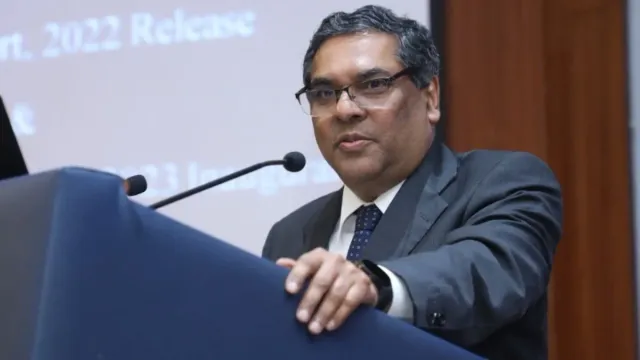- By Aashish Vashistha
- Mon, 11 Nov 2024 10:58 AM (IST)
- Source:JND
Justice Sanjiv Khanna on Monday (November 11) officially assumed office as the 51st Chief Justice of India, succeeding Justice DY Chandrachud. President Droupadi Murmu administered the oath to Justice Khanna at a ceremony held at Rashtrapati Bhavan. He will serve as Chief Justice for nearly seven months, with his term concluding on May 13, 2025.
#WATCH | Delhi: President Droupadi Murmu administers the oath of Office of the Chief Justice of India to Sanjiv Khanna at Rashtrapati Bhavan. pic.twitter.com/tJmJ1U3DXv
— ANI (@ANI) November 11, 2024
The event was attended by Prime Minister Narendra Modi and outgoing CJI DY Chandrachud. Justice Khanna was officially appointed by the Centre on October 24 following the recommendation of the outgoing Chief Justice.
Justice Chandrachud’s last working day in the Supreme Court was November 8 and judges, lawyers and staff of the top court and the high courts gave him a rousing farewell.
Who Is Justice Sanjiv Khanna
Born on May 14, 1960, Justice Sanjiv Khanna is a distinguished figure in India's judiciary with a career spanning several decades. He began his legal journey in 1983 as an advocate with the Delhi Bar Council and quickly established himself as a prominent expert in a range of legal fields, including constitutional law, taxation, arbitration, commercial law, and environmental law.
Over the years, Justice Khanna held significant positions, such as serving as the Senior Standing Counsel for the Income Tax Department and the Standing Counsel (Civil) for the National Capital Territory of Delhi starting in 2004.
ALSO READ: 'No Return Or Exchange' Policies Illegal, Against Consumer Rights: Gujarat Govt
Key Judgments Of Justice Sanjiv Khanna
Justice Sanjiv Khanna has been part of several landmark judgments in the Supreme Court of India. Some of his key judgments include:
Scrapping Of Electoral Bonds Scheme
Justice Khanna was part of CJI Chandrachud-led five-judge Constitution bench that struck down the Electoral Bonds Scheme. In his ruling, Justice Khanna stated that donor privacy does not apply to contributions made through banking channels, emphasizing that the identities of donors are "asymmetrically known" to the bank officers processing the bonds.
Upholding Abrogation Of Article 370
Justice Khanna was part of the five-judge bench that upheld the abrogation of Article 370, which granted special status to Jammu and Kashmir. He stated that Article 370 was an element of asymmetric federalism, not sovereignty, and its removal does not compromise India’s federal structure.
Grant Of Interim Bail To Arvind Kejriwal
Justice Khanna also played a key role in granting interim bail to Delhi's former chief minister, Arvind Kejriwal, in a liquor policy case, following which he could campaign for the 2024 Lok Sabha elections.
Upheld the Sanctity of EVMs
Justice Khanna was part of the bench that upheld the credibility of Electronic Voting Machines (EVMs), reinforcing their integrity in the electoral process.

